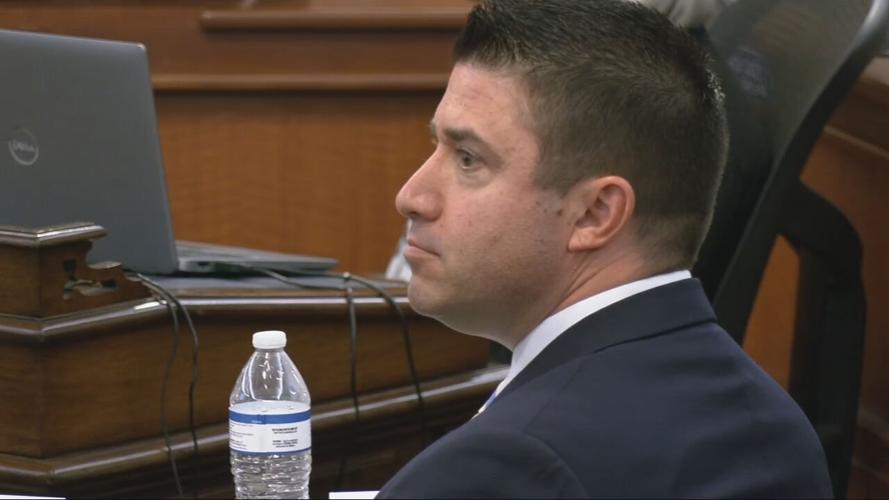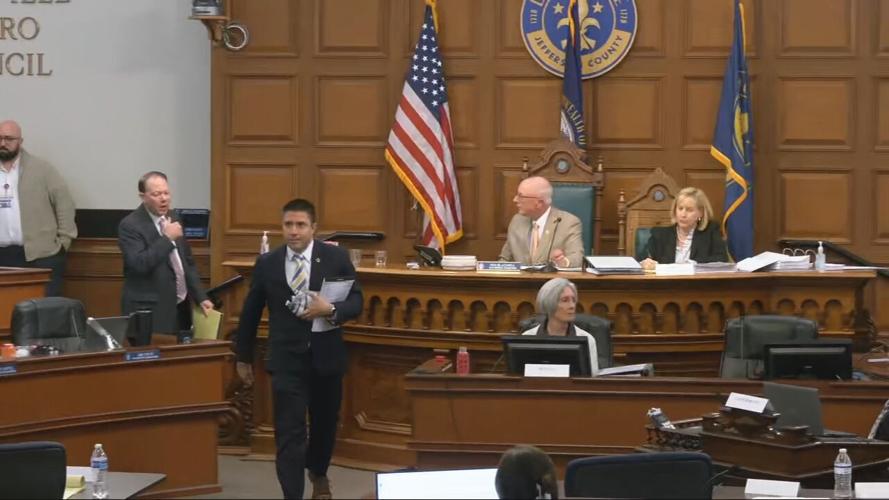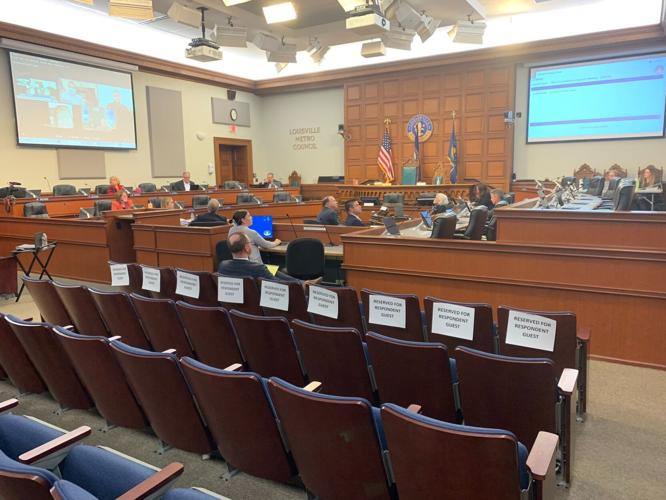LOUISVILLE, Ky. (WDRB) -- A Louisville Metro Council member's future on the council is in the hands of his colleagues as they decide whether to remove him for ethics violations.
The rare trial where councilmembers will consider removing a fellow member from office began Monday.
Councilman Anthony Piagentini, R-19, is accused of committing ethics violations when he co-sponsored an ordinance directing a $40 million federal grant that was awarded to his future employer, the Louisville Healthcare CEO Council, or CEOc.
The former council minority leader recused himself before the final vote on the funding. After the measure passed, Piagentini took a consulting job with the group. In October 2023, the bipartisan Louisville Metro Ethics Commission found Piagentini guilty on six of seven charges levied against him in the case and recommended he be removed from Metro Council. The grant money was later pulled by Louisville Mayor Craig Greenberg and has since been allocated elsewhere.
Piagentini continues to maintain his innocence. A month after he was found guilty, the councilman appealed the ruling, arguing in a lawsuit that the findings are "tainted by bias and must be reversed."
"I would rather die than accept what they have accused me of," he said following the ruling.
Piagentini's colleagues are now weighing the charges against him and the possibility of his removal. His 24 fellow Council members are serving as the jury. A majority vote of 18 is needed to remove him.
The removal trial for Councilman Anthony Piagentini is set to begin. Most members will be arriving at 5:30.
— Conroy Delouche (@ConroyDelouche) February 26, 2024
We expect to go until 9pm tonight. Here’s a look back at how we got here: @WDRBNews https://t.co/ezRzSy9XQ9
The Ethics Commission found Piagentini committed six ethics violations. Two additional charges were added by the Council's Charging Committee — formed shortly after Piagentini was found guilty by the Ethics Commission — based on the outcome of the ethics trial for a total of eight charges.
Over the next few days, the Council will hear from many of the same witnesses and see the same evidence from Piagentini's ethics trial that happened last summer.
Kent Wicker, the attorney for the Council's Charging Committee — which is made up of six Democrats — is presenting evidence that Piagentini committed misconduct as a Metro councilman working to get the grant for the CEOc. In his opening statement Monday, Wicker showed evidence that Piagentini had long been in discussions with CEOc and that securing the grant would help him get a job there, which he started at the same time the full Metro Council approved the grant. Wicker argued this case is bigger than just one member.
"Because what you do in this case, will tell all your constituents and everyone in the community whether the members of this Council can be trusted to hold each other accountable for what they do," Wicker said.
Piagentini's attorney, Michael Swansburg Jr., is hammering home the fact that the councilman abstained from the final vote and removed himself as a sponsor just before the vote. But Swansburg said that Wicker was painting a story that works, but left out plot holes, including that his client had been networking with other health care employers during the year leading up to the Council vote. Swansburg said the focus on the timing of the Piagentini's abstention proved his point, that he did ultimately abstain, and questioned whether or not the trial is really necessary.
"Yet here we are, sitting here, today talking about removing Councilman Piagentini," Swansburg said. "Not because he failed to remove himself as a cosponsor of the disputed ARP proposal, or abstained from voting on it. But because he didn't remove himself soon enough in the minds of his colleagues"
Councilman Anthony Piagentini, R-19, is accused of committing ethics violations when he co-sponsored an ordinance directing a $40 million federal grant that was awarded to his future employer.
Swansburg then tried to file another motion to dismiss all of Piagentini's charges, which was denied. Previous attempts to dismiss charges in pre-trial were rejected by a majority of the Council.
The first witness in the trial, Margaret Handmaker, was called around 9 p.m. Handmaker was the executive director of the Louisville Accelerator Team, and was part of the team that helped decide the best candidates for the federal funding that ultimately went to the CEOc.
Wicker pointed out that early on in the process, as the groups were evaluated, the CEOc actually scored 29th out of 30 eligible groups for the funding. Handmaker said that while they had good intentions, from a workforce development standpoint, there was little known about the project.
"It was a good idea, but it was a matter of time. They had to hire people," she said.
However, Handmaker did acknowledge that in the process, now-Council President Markus Winkler, D-District 17, who was a co-sponsor, was actually the one who hit the brakes on making a decision in funding at the time, which helped the grant swell to the eventual $40 million.
The trial will resume Tuesday at 5 p.m. and is scheduled to last until Wednesday, though many councilmembers said they anticipate it to go longer.
Related Stories:
- Removal trial for Louisville councilmember Anthony Piagentini set to start Monday
- Louisville Metro Council prepares for removal trial of councilmember Anthony Piagentini
- Metro Council Court meets to prepare for Louisville councilman's removal trial over ethics violations
- Louisville councilman facing removal over ethics violations loses leadership position
- Louisville Metro Council hears charges filed against Anthony Piagentini in ethics case
- Louisville Metro Council committee recommends removal charges for Anthony Piagentini in ethics case
- Metro Council member Anthony Piagentini appeals guilty ruling in ethics trial
- Metro Council committee reviewing Piagentini ethics case won't have GOP seat
- Metro Council close to forming Piagentini review committee
- Metro Council considers next steps after Piagentini ethics ruling
- Louisville commission finds Metro Councilman Anthony Piagentini committed ethics violations, recommends removal
Copyright 2024 WDRB Media. All Rights Reserved.

















